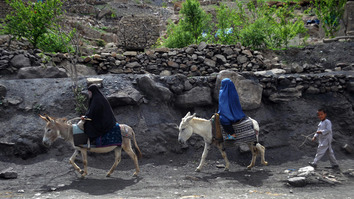KABUL -- Afghans in Ghazni Province continue to move about freely without worry of harassment after security forces cleared out Taliban militants who had laid siege on local residents in Qarabagh District.
For two weeks in early December, the Taliban ordered residents to pay ushr, zakat and other extortive taxes.
When residents defied the militants' demands, the Taliban set up roadblocks and laid land mines in a number of villages, threatening them with death and kidnapping.
"The Taliban [on December 5] demanded the residents of this district pay taxes, as well as ushr and zakat," Hussein, a resident of Qarabagh District, told Salaam Times.
"The residents of this district are mostly poor and therefore refused to pay any tax to the Taliban," he said. "Subsequently, [the Taliban] blocked their commuting routes and planted land mines to force payment."
"With the closure of roads, almost 3,000 families [faced] serious problems such as lack of access to health clinics and lack of food," Hussein said.
Afghan forces retaliate
Afghan security forces in December launched two operations in the district's northern and western areas. The first, in the middle of the month, cleared out the Taliban's land mines. The second, on December 28, re-opened roads.
"In an operation that lasted two days, security forces... cleared up some of the roads in which mines had been planted," Mohammad Arif Noori, a spokesman for the Ghazni provincial governor, told Salaam Times, referring to the earlier operation.
Since then, "three more security posts have been created in Qarabagh district and the Taliban threats no longer exist," Ghazni provincial police said in a statement to Salaam Times on January 26.
"We are committed to maintaining security for our people and the Taliban will no longer pose such a threat again," the statement added.
Taliban targets Hazaras, poor farmers
All villages subjected to the Taliban roadblocks had Hazara populations, said Khaliqdad Akbari, a member of the Ghazni Provincial Council.
"The assassination and kidnapping of the Hazaras by the Taliban have become the greatest source of concern for families," he told Salaam Times.
"Through collection of taxes, zakat and ushr, the Taliban want to continue their war and use this money as their source of revenue as well as for food," he said.
"Most residents of Qarabagh villages earn their living through farming and cannot afford to pay ushr or zakat," Adel Rezayi, a tribal elder from Qarabagh District, told Salaam Times. "By blocking the roads, the Taliban have created food shortages in those villages. Prices for food have gone up."
"[Last November], they killed three Hazara residents of this district," Rezayi said. "During the past four months, the Taliban forced more than 10 other residents of the district who were traveling to Ghazni city to get out of their vehicles. Nobody knows if they're still alive."
Condemning Taliban atrocities
"The murder of civilians by the Taliban ... imposition of restrictions on their daily lives, the abduction of hostages and demands for ransom under various pretexts ... all contravene international humanitarian principles and are considered crimes," Bilal Sediqi, a spokesman for Afghanistan's Independent Human Rights Commission, told Salaam Times.
"Denying roads to civilians, killing them and taking them hostage are condemned in any religion and sect," said Mohammad Nazari, a Kabul University student.
"The Taliban's actions show that they violate the principles of Islam and all humanistic values," he told Salaam Times.

![Afghan security personnel last December 26 guard a highway connecting Ghazni city to Qarabagh District. [Ghazni provincial governor's press office]](/cnmi_st/images/2018/01/26/11160-ghazni-585_329.jpg)






